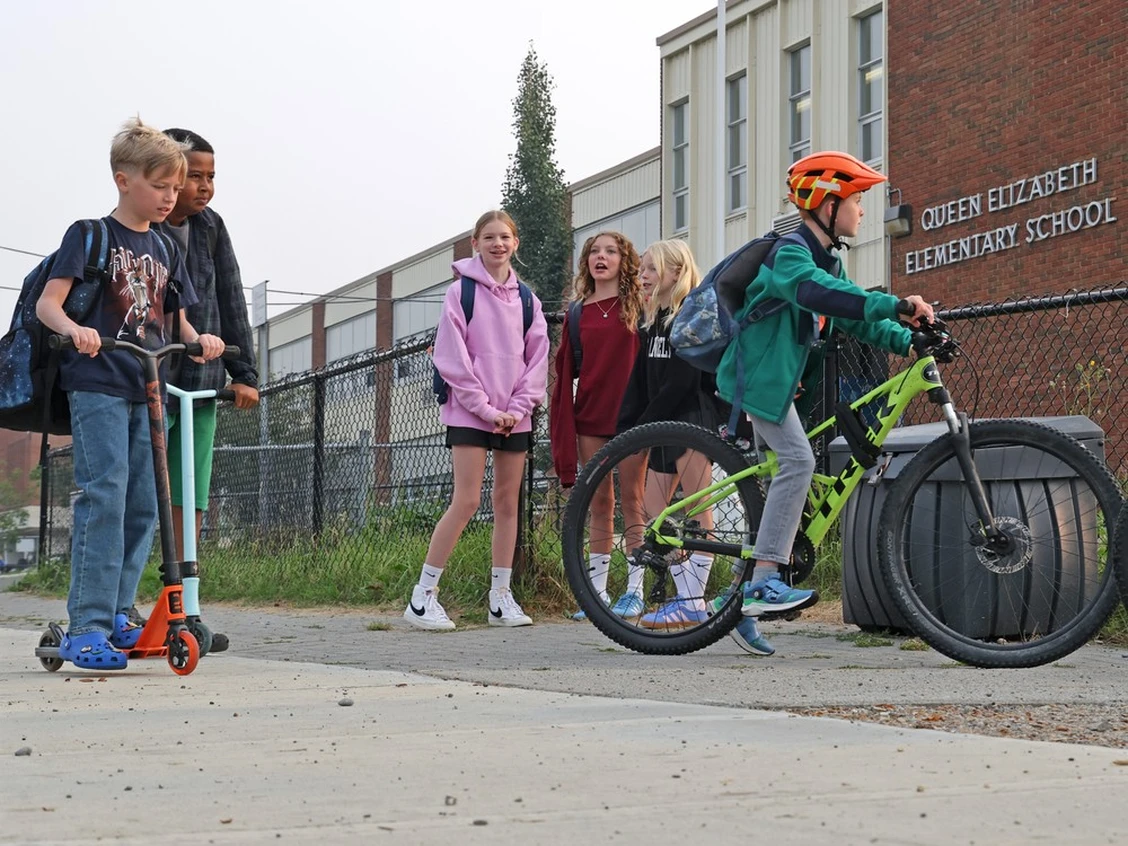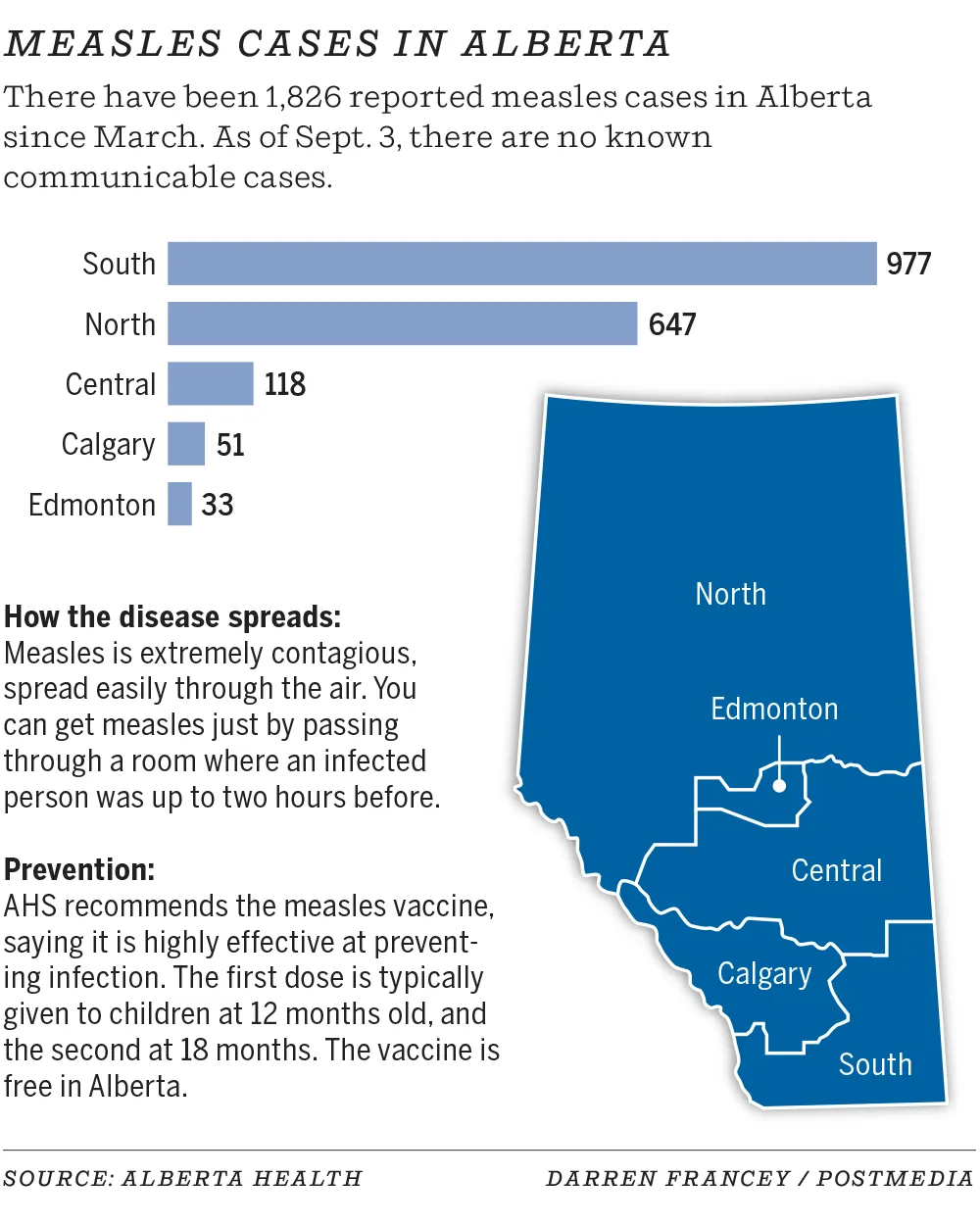‘We will see more spread’: Parents advised on measles protection as kids head back to school
As of Wednesday, Alberta has reported 1,826 cases since March, with no current active cases.

Students head in for the first day of classes at Queen Elizabeth School in Calgary on Tuesday. PHOTO BY GAVIN YOUNG/Postmedia Network
By Devika Desai, Calgary Herald September 03, 2025
As kids head back to school this week, schools say they will rely on direction from the province’s health authorities to mitigate any potential measles outbreaks in classes.
Schools and school boards say they have shared a letter by the province’s interim chief medical officer of health, Dr. Sunil Sookram, with parents, advising families of the measles outbreak in Alberta and how students can protect themselves against the disease.
“If your child is not protected against measles, public health teams will contact you,” the sheet reads. “If a contact is identified quickly, post exposure prophylaxis may be available.”
The sheet advised individuals exposed to the virus and unimmunized to stay home from activities in all public settings from five days after the first exposure to 21 days after the last exposure.
Those vaccinated against the virus are considered protected and would not have to stay home.
The Calgary Board of Education, the Calgary Catholic School Board and francophone school boards confirmed that they will not require students to be vaccinated against measles in order to attend classes. Should there be a measles outbreak, school staff have been directed to contact Alberta Health Services and encourage affected students to stay home to mitigate the virus spread.
Sookram’s letter emphasized that measles “can cause serious harm, particularly in children and other vulnerable individuals.”
As of Wednesday, the province has reported 1,826 cases since March, with no current active cases. The majority of cases are among children and teenagers, with 517 reported in children younger than five years and 801 reported in children aged five to 17 years.

| Measles Cases in Alberta. There have been 1,826 reported measles cases in Alberta since March. As of Sept. 3, there are no known communicable cases. Source: Alberta Health. Darren Francey / Postmedia |
| Measles outbreaks among kids |
“We’re close to that 2,000-case mark and we’ve seen in the last few months, it’s a highly, highly infectious virus,” Cora Constantinescu, a pediatrician who specializes in infectious diseases. “So it makes sense that when kids are back in indoor settings and in groups, we will see more spread, especially in the areas that have many active case and low immunization rates.”
Kids are more likely to catch the measles than adults, due to low vaccination rates over the past two decades, she added.
It’s hard to say which ages are likely to cause the most spread, she said; it might be more apt to say that those who are unimmunized might be more likely to spread the virus.
“If you think of measles as a destructive forest fire, it spreads and spreads as long as it is fuel to burn,” she said. “And once it hits immunized or immune people, that’s like a fire break. So this outbreak is going to go on until it meets that fire break.”
Unimmunized kids under five years are at higher risk of severity of the measles and can be especially prone to developing pneumonia, secondary infections and encephalitis. “Measles loves the lungs, so it can cause pneumonia, which is a huge source of hospitalizations and also death,” Constantinescu said.
Kids can also get immune amnesia after recovering from the measles, “which is essentially for the first few months after getting measles, all the immune system knows what to do is fight measles. It has forgotten how to fight other infections that it knew how to fight before,” she explained. This means that for the next few months after measles, kids may be more prone to infections that they’ve already had before.
Once a kid gets the measles, there is no cure, only support to mitigate the symptoms, she said.
Being hospitalized is its own trauma for children, she said. “Not only because of the missed school and missed activities but it’s also the trauma of being in hospital and for significant disease.”
| Teaching kids about measles |
Jocelyn Forrester, principal of Delta West Academy, said that at the start of the year, school staff revised their policies around communicable diseases with parents and junior and senior students during a back-to-school meeting.
“We haven’t necessarily had specific conversations around measles,” she said. “It’s just more about being at school, being healthy, contributing to a healthy school environment.”
Last year, during the respiratory virus season, parents and kids were both stressed about attending school and completing assessments. Part of the conversation this year emphasized to families that if kids are sick, the school would work with them to ensure that they are able to complete their assessments without penalties.
“If we do have kids who are sick and come in just to write an exam, we send them home,” Forrester said.
In the case of a measles outbreak, the school would inform provincial health authorities and rely on their instruction for next steps. The challenge would lie in needing to protect the patient’s information, given how small the school is, Forrester said. “It’s a little bit tricky but we do have to make sure that the information is getting out there to keep our students and staff protected as well.”
Constantinescu agreed with encouraging kids to stay home if they’re sick. “Schools can work to provide distance learning opportunities for kids,” she said.
She stressed the opportunity for teachers to teach their students about measles and the vaccines. “So kids can learn about vaccines early on and then bring that information home and hopefully support making immunization decisions a family decision and not just a parental decision,” she said.
“Schools are so good at encouraging those kind of discussions,” she added, having seen the impacts in her household, as a physician and mother of three.
| Encouraging students and families to get vaccinated |
While students are not required to be vaccinated against the measles to come to school, Sookram’s letter stressed that immunizations are the only way to protect against the disease.
According to Constantinescu, there is little else a school can do to protect against the virus. “Measles in the school building, it’s so infectious that it would find a non-immunized child and infect them,” she said.
However, at least acknowledging the measles cases and communicating it to parents can go a long way. “I know that as a parent, when the email came out from the schools that said we’re in the middle of a measles outbreak, it was actually really comforting to me,” she said.
According to a statement shared from the province’s primary and preventative health services ministry, the number of measles vaccinations doled out between March 16 and Aug. 23 of this year rose dramatically compared to last year, representing a 56 per cent increase.
In the South and North zones, vaccinations rose by 112 per cent and 90 per cent respectively, the statement said.
Cases have been trending down over the last several weeks and the vast majority of Alberta school children are vaccinated, it reads. Vaccination data shows the number of immunizations doled out per week in the province peaking in April, at 768 doses for the week of April 6 and since then declining.
The province has extended its “Don’t Get Measles, Get Immunized” campaign through mid-October, aimed at the back-to-school period. “This next stage is designed to reach families more directly and ensure parents have timely information as children return to school,” the statement reads.
Since the campaign launched in February, measles immunizations across Alberta have risen by 59 per cent compared to the same period last year.
Constantinescu helps run a vaccine hesitancy clinic at the hospital where she says she sees parents who are hesitant to vaccinate visit on a regular basis. “They’re not trying to be defiant,” she said. “They’re trying to do the best they can for their kids.”
Her most successful conversations have come from assuring parents that “we are on their side and we also want to help them make the best decision,” she explained. “Once you communicate that clearly, most parents are actually really open to having immunization… with counselling and support from us.”
She emphasized that vaccinations don’t just help those who receive the doses, but also those who can’t for medical reasons. “We cannot give it to kids who are immunosuppressed, who have cancer, a transplant, etc.,” she said. Instead it means families having to pull their kids from schools or activities.
“You can imagine the fear they live with to have their kid who may have cancer… and may get measles, which has a high mortality in kids who have cancer. It’s a really tough place for those families to be,” she said.
 Source Calgary Herald
Source Calgary Herald
Also see
2 new measles exposure sites in Winnipeg identified CBC
New measles cases lead to exposure warning at Halifax Infirmary CBC
AHS warns of possible measles exposure at U of A’s HUB Mall Edmonton Journal
